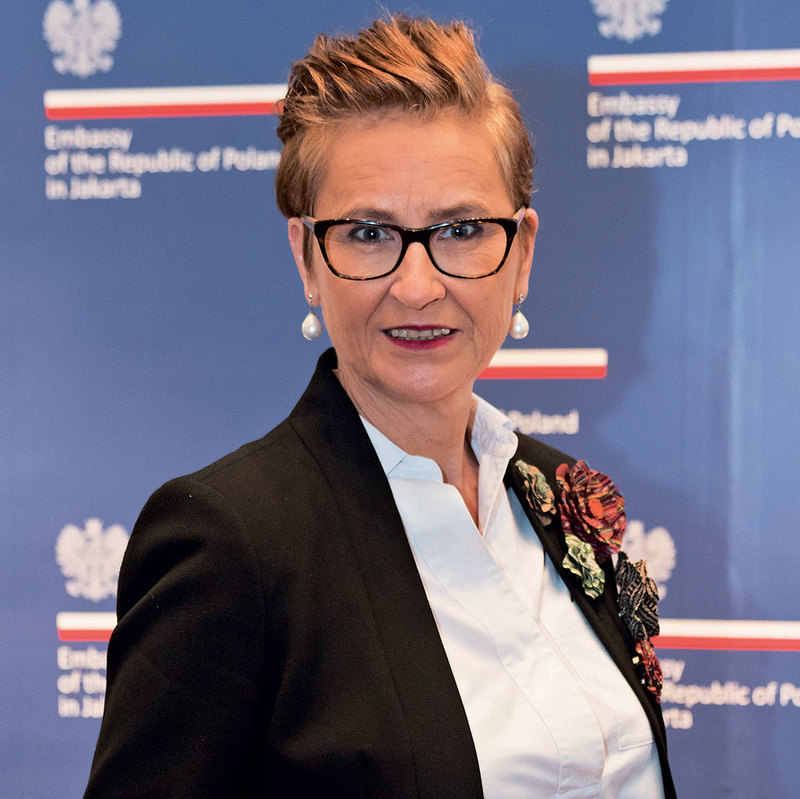
How would you characterise the relationship between Poland and Indonesia today?
It is a firm relationship, a good friendship with mutual respect. We are both countries that value democracy and freedom, including religious freedom. Our relationship started in 1955, so this year we celebrate its 65th anniversary. Yet, even a long time before then the Polish people were present in the archipelago, we have been connected.
For instance, in the early 20th century, professor Józef Zwierzycki surveyed the geological potential of Indonesia, including oil and tin, and created the first geological map of this area. He then became a lecturer at ITB. Also around that time, a Polish painter Czesław Mystkowski created beautiful paintings of the Balinese people and landscapes. In Medan, a visible sign of the Polish presence is the Polonia airport, named after a Polish landholder of that area, who was serving the local sultan in the late 19th century. Moreover, famous author Joseph Conrad-Korzeniowski, of Polish origin but writing in English, also travelled to East Kalimantan writing about that area in his first two novels. So the relationship with Indonesia had started long before the diplomatic ties were established.
What are the principal elements in the relationship? Economic, diplomatic or cultural?
While the main element in the relationship is economic, the diplomatic dimension has also been important. President Sukarno started this off strongly with his visit to Poland in 1959, combining political meetings with visits to universities.
Then in the mid 1960s, 20 Polish priests came to help Indonesia and were sent around the Nusantara, mainly to the NTT, to serve local communities, including in building roads and cultural centres. Some are still here.
At the moment, deepening of the economic is the priority. The Polish government opened the Trade and Investment office in the Jakarta Stock Exchange Building to help the businesses of the both countries to forge relationships.
Now, to bring our relationship to a higher level we need to ensure that the people of the both countries know each other better. To start this process, we conduct public diplomacy, including lectures, concerts, exhibitions and free Polish language courses – follow our social media for more. This becomes an umbrella for every other dimension of our relationship – trade, political, people-to-people contacts.
What are the main areas of trade between the two countries? What is the volume and value of the main trading items? Which areas do you want to develop more?
The value of trade between the countries is about USD 1 billion and is currently heavily in favour of Indonesia. This can be improved, both in value and balance.
As for food, we already offer our milk products, including tasty cheese. We hope that in the future Indonesia allows the famous Polish apples and berries to be offered to its citizens. Our fresh fruits can easily compete in quality with the products you import from other countries. We just need a little bit smoother cooperation with relevant authorities. And of course, we wish for more Indonesian fruits in our market.
Other products already gain popularity in Indonesia, but not everyone knows they are Polish. For instance Inglot, an exclusive, Muslim-friendly cosmetics brand.
Which Polish companies are there in operation in Indonesia? Are they being successful?
We have investments here in the energy sector with Rafako building, a coal-fired power plant in Lombok (two energy blocks, 50MW each) while using new low emission technology.
There are also KAP holding, currently building a poultry factory in West Java, and Famur selling mining equipment. All together there are 50 – 60 Polish companies, large and small, operating here. There are more potential investors to come, including in maritime, cyber security, IT and agriculture sectors. I spend a lot of time meeting Kadin & BKPM officials to create a groundwork for these future investments.
Is there much tourism between the countries? Do many Indonesians visit Poland? What are the main attractions and destinations?
As I said we want the people-to-people connection, then the business will follow. At the moment around 30,000 Poles visit Indonesia every year and the number is growing each year. That’s the result of the expanding Polish middle class and our EU membership, which opened up Poland to the world. Access is mostly by LOT operated chartered flights from Warsaw to Denpasar or, also by LOT, via Singapore. But the Middle Eastern airlines also connect well.
There are 600 – 800 Indonesians visiting Poland each year, mostly to Warsaw, the city of Chopin, and Krakow, our old capital, but also to Wieliczka for the salt mines and other UNESCO sites. Indonesians of all faiths have more to enjoy in my country: Muslims have a growing access to halal products while Catholics can visit various religious sites, including the birthplace of John Paul II.
Whatever the reason of their visit, I hope that more and more Indonesians will find our tourist offer interesting and get enchanted by the hospitality of our people.
What are you personally interested in developing further?
Education. Judging from my own experience, education is the key area conditioning success in life. And our country offers a high quality education in English for a very competitive price. So I want to bring more Indonesian students to Poland. I focus on medicine, engineering and maritime studies. The number is already quickly growing. Two years ago there were 70 students, now there are 300, and with luck, the 1000 mark will be achieved soon. I often visit universities, trying to encourage young Indonesians to continue their studies in Poland. And not all of them will have to pay the tuition fee! We offer the Lukasiewicz Scholarship with over 30 places annually, to study a fully-funded Master in technical studies, like engineering and agriculture.
There are moreover the Erasmus Plus scheme from the EU and an excellent relationship with the Governor of the NTB. Pak Governor has created a scholarship for the NTB students to study in Poland. Many universities also started bilateral cooperation with their Polish partners, including the maritime school of Jakarta, STIP.
I also wish to develop cooperation in vocational trainings. I imagine companies sending their workers to Poland to acquire new professional skills and then come back to contribute to the development of Indonesia. So in short, the human capital development is my top priority.
One other area I would like to emphasize is the Poland-Indonesia Interfaith Dialogue which will have its fourth round this year in Jakarta. We are bringing intercultural and interfaith experts in hope that we have a lot to learn from each other.
Tell us about the places you have visited in Indonesia? Which are your favourites? Where do you want to go next?
I have already visited many places: Aceh, Jambi, Lampung, Bangka Belitung, Natuna, most of Java, S. Kalimantan, South Sulawesi, NTB, NTT and Bali.
I really don’t have any favorites except perhaps Lombok & Bali, but I was very impressed by Flores. Poland is quite well known in the NTT province, and we also focus our development aid in the area.
My next visit is to North Sumatra to uncover the secrets of the Polonia airport!
Many thanks, H.E. Beata Stoczyñska, Polish Ambassador to Indonesia.






